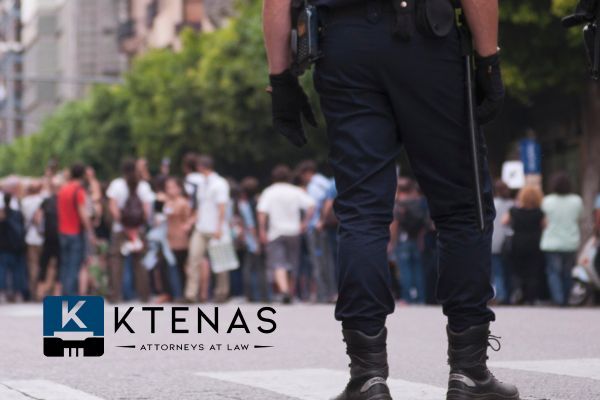Alternative Sentencing Options for Drug Charges in Chicago
2025-04-23T13:15:00
In Illinois, disturbing the peace is a misdemeanor offense that carries potential penalties of up to one year in jail and/or fines of up to $2,500. The exact penalty for a conviction depends on the severity of the incident, the criminal history of those involved, subsequent violations, and other factors determined by the court.
The most common form of disturbing the peace in Illinois is disorderly conduct. A disorderly conduct charge involves behaving “boisterously,” disruptive, or otherwise unreasonably loud in public. This includes making unreasonable noise and/or using offensive language that is likely to provoke a fight.
Disorderly conduct can also include disturbing religious services, memorial services, or funerals, obstructing roadways or police officers’ work, and making false reports for emergency services or false alarms such as false bomb threats.
Disturbing the peace charges can also involve more serious offenses such as inciting a riot or committing acts of violence in public. These are considered more serious offenses and can lead to higher penalties, including felony charges.
Those convicted of disturbing the peace may also be required to complete the community. Call Ktenas Law’s criminal defense attorneys in Chicago today for further assistance.
Disturbing the peace, according to Illinois law 720 ILCS 5/26-1, is a criminal offense when someone engages in public behavior that disrupts or alarms the general public.
This offense typically involves loud and unreasonable noise, fighting, using offensive language in a public place, or creating a hazardous or physically offensive condition. Depending on the severity of the disturbance, penalties for disturbing the peace can range from fines and hours of community service to jail time.
Disturbing the peace is a general term used to describe a variety of activities that disrupt public order or disturb those around them. Most states have statutes addressing these activities. According to this statute, it is illegal to deliberately fight or challenge someone to fight in a public place, maliciously and willfully disturb someone with loud and unreasonable noise, or use offensive words that are likely to provoke violence. Intentionally engaging in any of these activities can lead to criminal charges.

Furthermore, one cannot breach the peace by accident; meaning that even if the individual does not intend for it to cause a disturbance, they could still be considered guilty. Individuals in the community need to think about their actions before engaging in behaviors that could be illegal, as disrupting the peace can have serious consequences for both themselves and others.
Disturbing the peace is a legal term that covers a variety of behaviors including public fights, loud arguments, and other acts meant to alarm and provoke others. In Illinois, this crime is formally referred to as ‘disorderly conduct’ and can be charged if someone engages in any activity deemed objectively unreasonable and alarming to neighbors or bystanders.
This includes everything from an altercation with a neighbor to playing music at excessive volumes throughout the night. It also includes engaging in the act of making prank 911 calls regarding false fire alarms, bombs, or other emergencies of imminent danger, as well as making false police reports, all of which can result in serious consequences.
Failing to maintain peaceful relations within your community can result in criminal penalties, such as a prison sentence of up to 30 days and/or fines, depending on the seriousness of your actions.
Not only can disturbing the peace negatively affect police officer resources but it may also interfere with the tranquility that communities try so hard to preserve. Because of this everyone needs to abide by local ordinances when it comes to noise levels, behavior, and interactions with one another so as not to jeopardize these goals of maintaining harmony.
Disturbing the peace is commonly used as a plea bargain for more severe crimes, such as physical altercations or threats. In cases where a person has been involved in physical altercations resulting in battery charges, public intoxication with physical contact with others or private property, or even aggravated battery, charges may be pressed.

However, with a plea agreement, you may instead be able to plead guilty to a lesser offense such as disturbing the peace. This applies to all kinds of more serious crimes and is a way for prosecutors to offer leniency while still securing punishment that fits the crime. Whether an individual prosecutor will make such an offer will depend on factors like how severe the offense was, how strong the evidence is, and any prior criminal activity of the accused. It’s good to keep in mind that simply being charged with a crime doesn’t guarantee conviction for it and that there are alternative options available due to plea bargaining agreements.
In Illinois, a breach of the peace is defined as any act or behavior that threatens or alarms another person, causes physical injury to another person, disrupts civil order, or poses a risk of harm to members of the public.
Breaking the peace also encompasses various types of public disturbances, including fighting in public, shouting obscenities, creating excessive noise at night, engaging in disorderly conduct, and making false claims that endanger human life.
Penalties for disturbing the peace can vary from state to state, though it can sometimes be a serious offense. For misdemeanor charges, jail time is often a potential consequence, with maximum penalties ranging from 60 days to up to one year. Felony convictions can have even harsher consequences, with possibly up to several years spent in state prison for those found guilty of the crime.

However, fines are also a common punishment for disturbing the peace. Depending on where you live and what kind of charges you’re facing, it’s possible that your fine could range anywhere from a few hundred dollars to thousands. Additionally, community service and probation may be ordered as part of your sentence depending on your case specifics. Understanding the penalties that come along with breaking the law can help prevent someone from making poor decisions and ending up behind bars or subject to heavy fines and fees.
If you have been charged with the crime of disturbing the peace in Illinois, contact Ktenas Law for experienced criminal defense lawyers. Disturbing the peace is an offense that can lead to serious penalties and a permanent criminal record. Our skilled legal defense attorneys understand how to defend against these charges and will fight to reduce or dismiss your charges.
In Illinois, disturbing the peace is typically charged as a Class C misdemeanor, which carries a potential penalty of up to 30 days in jail and/or a fine. Depending on the severity of the offense, it may be possible for us to negotiate a plea bargain with the prosecutor to reduce these penalties.
Contact Ktenas Law today for legal assistance regarding charges of disturbing the peace in Illinois.

2025-04-23T13:15:00

2025-04-07T11:50:40

2025-03-24T11:55:03

